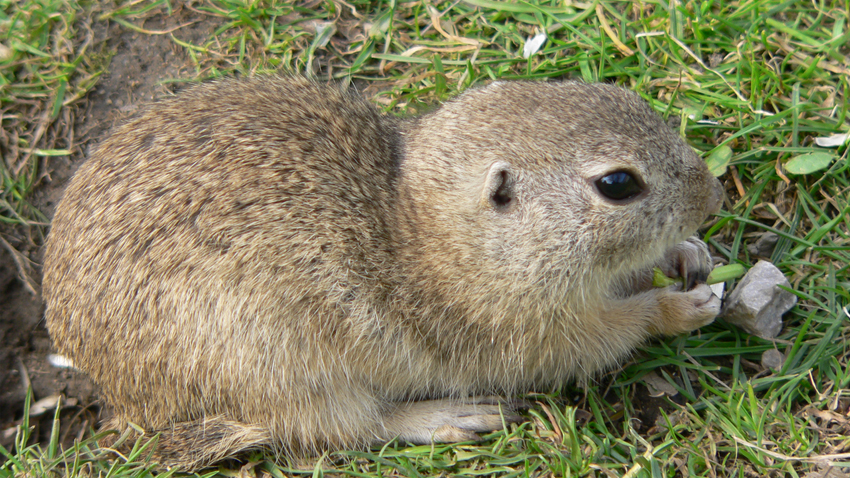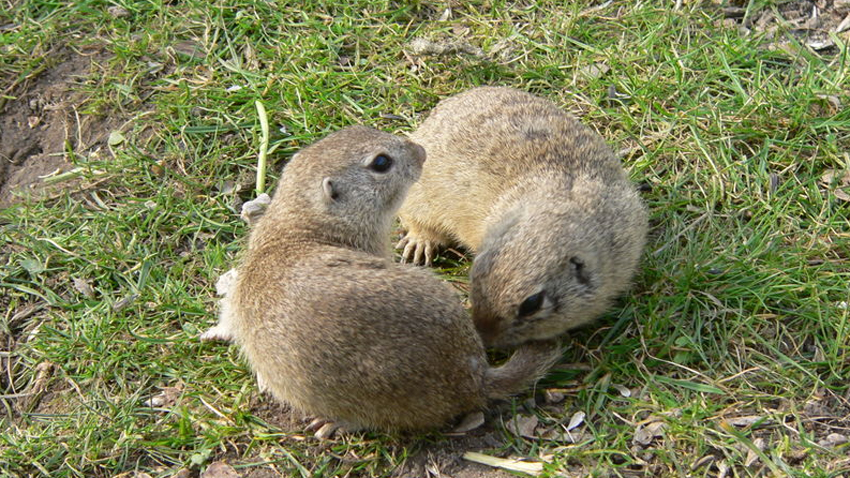The European ground squirrel (Spermophilus citellus) is a cute animal that looks a lot like the American marmot and is one of the most important species for conservation in Europe. It is found only in the eastern parts of the continent. The species is now extinct in Germany and highly endangered in the Czech Republic. It can still be seen in Hungary, Romania, Bulgaria, and Greece and partly in the European territory of Turkey. According to a recent genetic study conducted by an international team, including scientists from Bulgaria, the Czech Republic, Germany and Turkey, the European ground squirrel is actually Bulgarian in origin, i.e. it emerged on these lands more than one million years ago. Its habitats are priorities for conservation in the Natura 2000 European ecological network.
The European ground squirrel is one of two species of ground squirrels that can be found on the continent, Associate Professor Jordan Koshev from the Institute of Biodiversity and Ecosystem Research at the Bulgarian Academy of Sciences says.

"One is the speckled ground squirrel, which is found to the north in Poland and Russia and it is actually a foreigner. The other one is the European ground squirrel, which has a limited distribution almost exclusively in the EU. Therefore, it appears endemic to the Union and its protection is of great importance for Europe."
So it turns out that the European ground squirrel is Bulgarian in origin. Clues that its roots lie in the distant history of our lands have emerged during paleontological excavations.
"We have discovered fossils of the species in Bulgarian caves and thought the animal probably originates from this territory,” the scientist says. “We managed to confirm this by using new methods of genetic study and learned about its history from the times when the species originated to its expansion on the continent. We proved that the species originated from these lands, because the highest genetic diversity is seen here. In Bulgaria 5 of the 7 known genetic lines of the species have been discovered. That is why Bulgaria is so important for the conservation of the European ground squirrel."
An international scientific team reached these conclusions after studying the genes of 915 ground squirrels from 11 countries in Central and Eastern Europe.
But why is it so important to study the ground squirrel?
"The souslik is very important animal for ecosystems,” says Mr. Koshev. “It is considered a key species because it creates a favorable habitat for other species through digging holes. At the same time it is food for many predators like falcons, eagles, etc. A number of species use the ground squirrel for food and their populations decline with the decline of the number of sousliks.”

What is the situation in the ecosystems in western Europe where the European ground squirrel never existed?
"Widespread there are a species of underground rabbits. They live in holes and go out to the surface to feed. In Western Europe the rabbit is the favorite food for predators, which otherwise prefer the souslik in Bulgaria. This type of wild rabbit is unknown in Bulgaria.”
The results of the study will be used to better work on the conservation of the European ground squirrel in the areas where it still occurs. The aim is also to help it return to places where it cannot be seen anymore. Bulgaria has already made successful attempts for the reintroduction of the species in some natural parks. A study will also identify how climate changes affect the ground squirrel and its distribution in Europe. This way more effective measures for its protection can be taken.
English: Alexander Markov
The monument on Mount Buzludzha - a symbol of the socialist era in Bulgarian history and a "star" among lovers of dark tourism, is once again the venue of a festival with a modern spirit and cause. For the fifth year, OPEN BUZLUDZHA offers a..
In the heart of the Rose Valley, at the foot of the Stara Planina and Sredna Gora Mountains, the Kalofer Lace Festival is being held for the 26th time. The range of events is rich - guests of the two sub-Balkan towns, Karlovo and Kalofer, are..
For the sixth year, the Bulgarian School "St. Cyril and Methodius" in Boston, USA, is organizing a Bulgarian language exam with the assistance of the Department of Language Education at Sofia University "St. Kliment Ohridski". This was announced by the..
The monument on Mount Buzludzha - a symbol of the socialist era in Bulgarian history and a "star" among lovers of dark tourism, is once again the venue..
For the sixth year, the Bulgarian School "St. Cyril and Methodius" in Boston, USA, is organizing a Bulgarian language exam with the assistance of the..
In the heart of the Rose Valley, at the foot of the Stara Planina and Sredna Gora Mountains, the Kalofer Lace Festival is being held for the 26th time...

+359 2 9336 661
